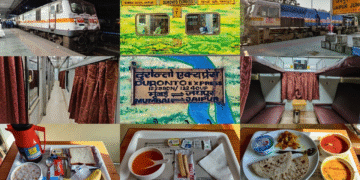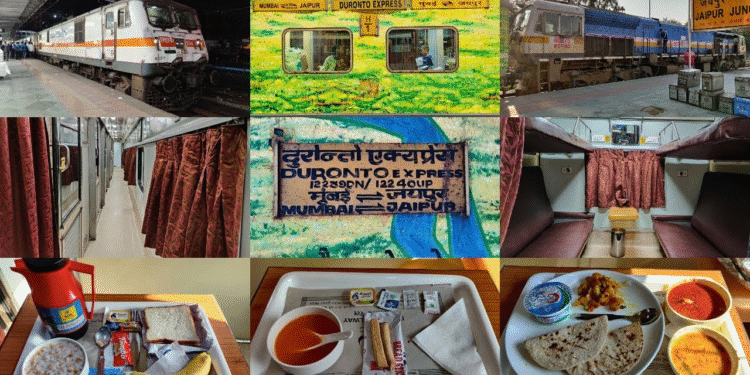Four killed on Jaipur-Mumbai train: An Army man says he saw a former RPF constable shoot his senior officer before firing at passengers. Read the full report on the shocking train tragedy, eyewitness accounts, investigation updates, and latest developments in the case
In a shocking and deeply disturbing incident aboard the Jaipur-Mumbai Central Superfast Express (Train No. 12956), a member of the Railway Protection Force (RPF) has been accused of opening fire inside the moving train, killing four people — his senior officer and three passengers — before being apprehended.
What Happened: The Sequence of Events
In the early hours of Monday, 31 July 2023, the train bound from Jaipur to Mumbai was nearing the western suburbs of Mumbai, having crossed Vapi station in Gujarat and moving toward Palghar. It was at this stage that the violence erupted.

The accused is Chetan Singh (sometimes reported as Chetan Kumar or Chetan Chaudhary in media), a constable posted with the RPF’s Lower Parel unit, Mumbai. He was on escort duty aboard the train, along with senior officer Tikaram Meena (ASI, RPF) and other RPF/GRP personnel.
According to official sources:
- At around 5 a.m., Chetan Singh reportedly fired multiple rounds from his service rifle inside coach B5, killing ASI Tikaram Meena, his senior colleague.
- He then moved through multiple coaches of the train — reportedly to Coach B5, then a pantry car, then Coach S6 — and shot three passengers, identified in reports as Abdul Kadar Bhanpurwala (62) and Asgar Abbas Shaikh (48) among them.
- One unidentified passenger was also killed, bringing the total to four dead.
- After the alarm chain was pulled between Mira Road and Dahisar, the train halted near Borivali. The accused attempted to flee but was caught by GRP/RPF officials at Mira Road.
In the weeks that followed, the case moved into the courts and investigations deepened.
Eyewitness Accounts & Court Testimony
Several passengers and railway personnel have deposed in court, shedding light on what unfolded inside the train.
- A key witness, a 53-year-old businessman on board that morning, testified that he saw Chetan Singh point a rifle at him and his wife, prompting him to pull the emergency chain in panic.
- Another female passenger, 29 years old, later testified that she saw the accused argue with a “bearded person” (later identified as a victim) and then shoot him twice. She positively identified Chetan Singh via video-link in court.
- According to RPF/GRP statements, Singh had been described by senior officers as having a “short fuse” and being “hot-headed.” Officials mentioned that there was apparently no overt altercation just before the incident, suggesting perhaps a sudden breakdown.
Who Are the Victims?
The deceased include:
- ASI Tikaram Meena (57) of RPF — posted at Dadar RPF post. He hailed from Sawai Madhopur district in Rajasthan and was due to retire in 2025.
- Passenger Abdul Kadar Bhanpurwala (62) — identified in the reports.
- Passenger Asgar Abbas Shaikh (48) — identified among the victims.
- A third passenger, identity still unclear in some reports, making up the total of four fatalities that morning.
Motive, Investigation & Raises of Hate Crime Allegation
The motive behind the mass shooting remains under investigation, but media reports and testimonies suggest a complex mix of factors:
- According to the FIR and investigation records, one immediate trigger appears to be a dispute between the accused constable and his senior over leave and being unwell. The constable had reportedly asked to be relieved because he was “unwell,” but was asked to continue duty — which allegedly led to the flashpoint.
- Beyond this, there are strong suggestions of communal motivations: videos circulating after the incident allegedly show the accused making inflammatory remarks, referencing “If you want to live in India, vote for Modi and Yogi…” while standing next to a victim’s body.
- The charge-sheet filed by GRP (over 1,000 pages) concluded the accused was mentally fit to stand trial — the mental-illness defence was rejected.
The broader investigation is still examining whether the killings of the three passengers were selective (on communal lines) and if standard RPF/railway security protocols were relaxed or breached.
Railway Security, Protocols & Questions Raised
This case raises several alarming questions about security arrangements on long-distance trains and oversight of armed railway personnel:
- The escort team comprised four RPF personnel including the accused. Security on the run from Surat to Mumbai should have included adequate checks, but the shooting happened early morning while the train was still in motion.
- The accused was armed with his service rifle (automatic weapon) while on duty; yet the internal oversight appears to have failed in identifying his unstable state or intervening preventively. Reports say RPF officers had described him as “hot-headed.”
- The incident triggered the pulling of the emergency chain and panic among passengers — which then allowed the accused to attempt escape. That chain-pulling halt may have been critical to ending the rampage.
- Compensation announcements followed: Railways announced amounts for the family of the ASI and other victims. But questions remain about systemic reforms: Are escort duty procedures, mental-health screening of armed personnel, and inter-agency coordination (RPF/GRP) sufficient?
Court Proceedings & Current Status
- The trial is underway before the Dindoshi Sessions Court in Mumbai. Recently, the court declared that the accused is fit to stand trial after a delay related to his mental-health claims.
- Witness depositions continue. Six or more witnesses have already deposed — including passengers who pulled the chain, train-guards, and those who were threatened by the accused.
- The court hearings are seen as critical not only for justice for the victims and their families but also for establishing the nature of the crime (whether it was primarily a workplace dispute, a mental-health breakdown, or a communal/hate incident).
- The investigation and the charge-sheet include serious sections under the Indian Penal Code (IPC) and Arms Act: murder (Section 302 IPC), Arms Act offences, Indian Railways Act sections, and communal/hatred-based offences (Sections 153A etc) have been invoked.
Wider Implications & Reactions
- The incident has shocked railway staff, security agencies, travelling public and raised fears about safety inside moving trains. Many travellers board long-distance trains expecting safety from security escorts — this event shatters that assumption.
- For passengers and staff alike, this is a wake-up call: armed personnel in transit environments carry enormous responsibilities; protocols (psychological fitness, situational awareness, conflict-resolution) must be robust.
- Communal implications: With indications of potential communal motives, the case spotlights rising concerns of violence being carried out in public spaces under the arms of uniformed personnel.
- For the Railways and RPF, there will undoubtedly be internal inquiries, review of duty rosters, psychological screening of armed staff, training for escalation/de-escalation, and possibly stricter oversight of weapons aboard moving trains.
What Comes Next?
In the coming months:
- The court will continue to hear more eyewitnesses, forensic evidence, mobility of the weapon, sequencing of firing across coaches, video-evidence authenticity, and motive.
- Railways and RPF likely to publish internal report/panel findings (though publicly only limited portions are shared) on how the security breach occurred and what preventive steps will be taken.
- Families of the victims and the victims themselves (where survivors exist) will be looking for justice, timely compensation, and systemic changes so that such an incident never recurs.
- For passengers at large, this incident may prompt more vigilance: who is escorting the train, check for security procedures, remain aware, and know emergency procedures (chain-pulling, flagging staff, alerting control rooms).
Conclusion
On the morning of 31 July 2023, what was supposed to be a routine journey on the Jaipur-Mumbai Central Superfast Express turned into a nightmare. A trained security guard — entrusted with the safety of the train and its passengers — allegedly turned his weapon on his own senior and then on innocent travelling civilians. Four lives were lost; many others left deeply traumatised.
The venue of the crime — a moving train, in the predawn hours, as passengers slept — underscores how vulnerable we may be even in seemingly secure spaces. As the courts deliberate, the Railways must take urgent steps to restore trust, tighten oversight, and ensure that those in uniform are never the source of danger for those they are meant to protect.
For the families of the dead: ASI Tikaram Meena, Abdul Kadar Bhanpurwala, Asgar Abbas Shaikh and the unidentified passenger — justice delayed must not become justice denied. For millions of travellers across India: this incident should serve as a wake-up call to the fragility of safety, and the pressing need for accountability, training, and oversight in our transport systems.
Also Read : Will Mumbai See Heavy Rain Today or Was the Arabian Sea Depression A Brief Spell? Check AQI















 Categories
Categories









